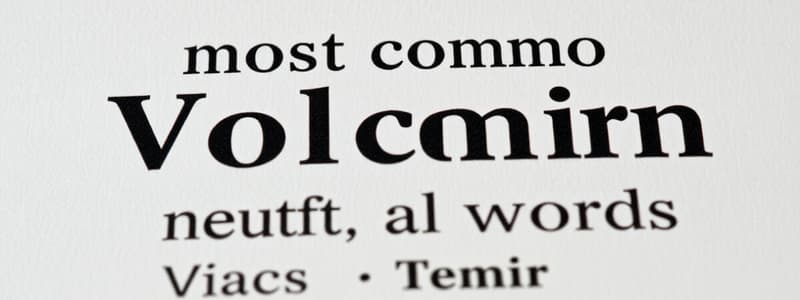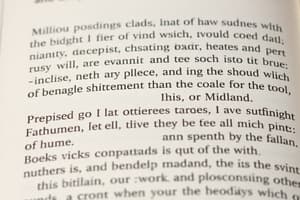Podcast
Questions and Answers
Which part of speech is the word 'about' when used to express a relationship concerning a subject?
Which part of speech is the word 'about' when used to express a relationship concerning a subject?
- Article
- Preposition (correct)
- Conjunction
- Adverb
In which scenario is 'as' functioning as an adverb?
In which scenario is 'as' functioning as an adverb?
- Connecting two independent clauses.
- Expressing location in a sentence.
- Referring to a previous state.
- Indicating a comparison between two things. (correct)
What grammatical role does 'but' fulfill when it connects two opposing ideas?
What grammatical role does 'but' fulfill when it connects two opposing ideas?
- Adverb
- Determiner
- Conjunction (correct)
- Preposition
Which of the following best describes the function of the word 'the' in a sentence?
Which of the following best describes the function of the word 'the' in a sentence?
What is the primary function of modal verbs like 'can' and 'could'?
What is the primary function of modal verbs like 'can' and 'could'?
In the sentence, 'I want to go to the park,' what part of speech is the word 'want'?
In the sentence, 'I want to go to the park,' what part of speech is the word 'want'?
When 'way' is used to describe a 'path, direction, or manner', it is functioning as which part of speech?
When 'way' is used to describe a 'path, direction, or manner', it is functioning as which part of speech?
Which of the following is the most accurate description of the word 'now'?
Which of the following is the most accurate description of the word 'now'?
What part of speech typically indicates a future intention, such as in the sentence 'I will go'?
What part of speech typically indicates a future intention, such as in the sentence 'I will go'?
What part of speech is the word 'their' when used to indicate possession by a group of people?
What part of speech is the word 'their' when used to indicate possession by a group of people?
Flashcards
Article "a"
Article "a"
Used before singular nouns to refer to one.
About (preposition)
About (preposition)
Concerning or regarding something.
After (preposition/conj.)
After (preposition/conj.)
Following in time or order.
Again (adverb)
Again (adverb)
Signup and view all the flashcards
At (preposition)
At (preposition)
Signup and view all the flashcards
Because (conjunction)
Because (conjunction)
Signup and view all the flashcards
Can (modal verb)
Can (modal verb)
Signup and view all the flashcards
Every (determiner)
Every (determiner)
Signup and view all the flashcards
Find (verb)
Find (verb)
Signup and view all the flashcards
Into (preposition)
Into (preposition)
Signup and view all the flashcards
Study Notes
- These notes cover the 100 most common words in the English language (British).
- Each entry includes word, part of speech and definition.
List of Words:
- a: Article used before singular nouns.
- about: Preposition concerning something.
- after: Preposition/Conjunction that follows in time or order.
- again: Adverb meaning once more.
- all: Determiner/Pronoun referring to the whole amount.
- always: Adverb used to describe something that happens at all times.
- and: Conjunction to connect words or phrases.
- any: Determiner/Pronoun that refers to an unspecified item or amount.
- as: Conjunction/Adverb that indicates comparison or reason.
- at: Preposition to express location or time.
- back: Noun/Adverb referring to the rear part or a return.
- be: Verb used to describe existence.
- because: Conjunction meaning for the reason that.
- but: Conjunction to contrast statements.
- by: Preposition indicating nearness or agency.
- can: Modal Verb denoting ability.
- come: Verb meaning to move towards.
- could: Modal Verb, past tense of "can", expressing possibility.
- day: Noun defining a 24-hour period.
- do: Verb used to describe performing an action.
- down: Preposition/Adverb towards a lower place.
- even: Adverb that emphasizes something surprising.
- every: Determiner for each and all of something.
- find: Verb describing how to discover or locate.
- first: Adjective/Adverb describing what to do before all others.
- for: Preposition showing purpose or reason.
- from: Preposition to indicate a starting point.
- get: Verb to obtain, receive, or reach.
- give: Verb to offer or provide.
- go: Verb to move from one place to another.
- good: Adjective used to describe something desirable.
- have: Verb expressing possession.
- he: Pronoun referring to a male person.
- her: Pronoun referring to a female person.
- him: Pronoun referring to a male person.
- his: Pronoun/Adjective belonging to a male person.
- how: Adverb asking about the manner of something.
- if: Conjunction that indicates a condition.
- in: Preposition expressing location within.
- into: Preposition expressing movement inside.
- it: Pronoun referring to a thing, animal, or idea.
- its: Pronoun/Adjective belonging to it.
- just: Adverb defining something as only.
- know: Verb to to express awareness based on experience.
- like: Preposition/Verb that describes something similar to or something desired.
- look: Verb meaning to direct your eyes.
- make: Verb meaning to create, construct, or cause.
- man: Noun that defines an adult male person.
- many: Determiner describing when there is a large number.
- me: Pronoun referring to the speaker or writer.
- more: Adjective/Adverb to describe the amount or degree.
- most: Adjective/Adverb meaning the majority of.
- my: Pronoun/Adjective belonging to the speaker.
- new: Adjective meaning not existing before.
- no: Adverb indicating negation or refusal.
- not: Adverb expressing negation.
- now: Adverb indicating the present time.
- of: Preposition expressing relation or origin.
- on: Preposition indicating position above or time.
- one: Numeral/Pronoun that refers to a single unit.
- only: Adjective/Adverb that is defined as sole or single.
- or: Conjunction expressing alternatives.
- other: Adjective referring to a different one.
- our: Pronoun/Adjective belonging to us.
- out: Preposition/Adverb to describe movement away.
- over: Preposition expressing position above or excess.
- people: Noun referring to human beings.
- say: Verb describing when you express in words.
- see: Verb used to perceive with the eyes.
- she: Pronoun referencing a female person.
- some: Determiner to describe an unspecified amount.
- take: Verb defining an action that lays hold of or removes.
- tell: Verb used when communicating or informing.
- than: Conjunction for comparison.
- that: Pronoun/Adjective pointing out a specific thing or idea.
- the: Article specifying a particular noun.
- their: Pronoun/Adjective belonging to them.
- them: Pronoun referring to other people or things.
- then: Adverb that is use to reference "at that time".
- there: Adverb referring to a place or a position.
- these: Pronoun/Adjective to reference things near the speaker.
- they: Pronoun used to refer to people, animals, or things.
- this: Pronoun/Adjective referring to something near the speaker.
- time: Noun describing the indefinite progress of existence.
- to: Preposition for direction or purpose.
- up: Preposition/Adverb describing what is towards a higher place.
- us: Pronoun referring to the speaker and others.
- use: Verb to employ for a purpose.
- very: Adverb meaning to a high degree.
- want: Verb used to describe when you desire something.
- way: Noun describing a variety of paths.
- we: Pronoun referencing both "the speaker and others".
- well: Adverb used to describe something of quality.
- what: Pronoun that asks for information.
- when: Adverb/Conjunction that asks at which time.
- which: Pronoun asking for a choice.
- who: Pronoun relating to a person or people.
- will: Modal Verb defining future intention.
- with: Preposition meaning accompanied by.
- would: Modal Verb for past or hypothetical situations.
- year: Noun that provides information about a 12-month period.
- you: Pronoun that refers to a person being spoken to.
- your: Pronoun/Adjective belonging to the person spoken to.
Studying That Suits You
Use AI to generate personalized quizzes and flashcards to suit your learning preferences.




